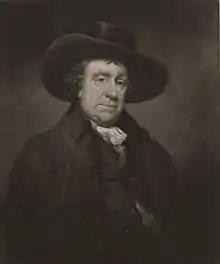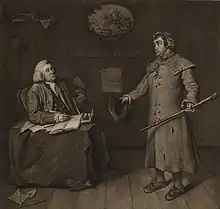John Moody (actor)
John Moody (1727?–1812), original name John Cochran, was an Irish actor.

Life
The son of a hairdresser named Cochran, he was born in Cork and followed his father's occupation; his own account was that he was born in Stanhope Street, Clare Market, London. To the end of his life he claimed to be a Londoner. Perhaps to avoid being a forced recruit at the time of the Jacobite rising of 1745, he went to Jamaica. [1]
Returning to England as Moody, with some property and acting experience, he went on the Norwich circuit. He took the lead in both tragedy and comedy. Tate Wilkinson claimed to have been, 20 June 1759, at Portsmouth, Lord Townley in The Provoked Husband (John Vanburgh and Colley Cibber) to Moody's Manly, with Moody having just arrived from Jamaica. [1]
The London stage
Hired by David Garrick for Drury Lane, on 31 October 1759 Moody was the original Kingston in High Life Below Stairs, and on 12 February 1760 created his major character of Sir Callaghan O'Brallaghan in Charles Macklin's Love à la Mode.[1][2]
With one season at the Haymarket Theatre, and occasional visits to the country, Moody remained at Drury Lane until the end of his theatrical career. In the season of 1760–1, he tried Teague in The Committee (Sir Robert Howard), one of his great parts.[3][4] As the Irishman in The Jubilee (Garrick), and on 19 January 1771 as Major O'Flaherty in The West Indian, he was becoming typecast as a stage Irishman. He played a Scottish servant, Colin MacLeod, in The Fashionable Lover, 20 January 1772, but he resumed his Irish types as Sir Patrick O'Neale in The Irish Widow, 23 October 1772, and O'Flam in Samuel Foote's The Bankrupt, in which, 21 July 1773, he appeared at the Haymarket.[1][5]

In Liverpool, where Moody acted during the summer, and in other country towns, he tried more ambitious parts, as the King in First Part of King Henry IV, Iago, and Shylock.[1]
Later years
After the season of 1795–6 the management, faced with Moody's spiritless performances, did not engage him, and he went into retirement. He emerged to play at Covent Garden, for the benefit of the Bayswater Hospital, 26 June 1804, Jobson in the Devil to Pay.[1]
Moody retired to Barnes Common, as a market gardener. He died 26 December 1812, at Shepherd's Bush (according to the Gentleman's Magazine), or in Leicester Square (according to the European Magazine). He wished be buried in St. Clement's burial-ground, Portugal Street, Lincoln's Inn Fields, and that the headstone should bear the words, "A native of this parish, and an old member of Drury Lane Theatre;" but the cemetery was full, and his remains were interred in the churchyard at Barnes, near those of his first wife, who died 12 May 1805, aged 88. His widow, Kitty Ann Moody, died 29 October 1846, aged 83.[1]
Notes
- Lee, Sidney, ed. (1894). . Dictionary of National Biography. Vol. 38. London: Smith, Elder & Co.
- During this season he was the first clown in Garrick's pantomime, 'Harlequin's Invasion,' played an original part in 'Every Woman in her Humour,' assigned to Mrs. Clive, and was Sable in the 'Funeral.'
- Also Foigard in The Stratagem, Obediah Prim in A Bold Stroke for a Wife, Robin in Contrivances, Vulture in Woman's a Riddle, and was the original Captain O'Cutter in Colman's Jealous Wife, and Irishman in Reed's The Register Office.
- Among characters assigned him in years immediately following were Henry VI, Richard III, the Miller of Mansfield, Peachum in the Beggar's Opera, Bullock in The Recruiting Officer, Stephano in The Tempest, John Moody in The Provoked Husband, Adam in As you like it, Ben in Love for Love, Teague in The Twin Rivals, Simon Burly in The Anatomist, Vamp in The Author, and innumerable others. He was the original Cratander in John Delap's version of Hecuba.
- Back at Drury Lane he was, 9 November 1773, the original Commodore Flip in The Fair Quaker, an alteration, attributed to Edward Thompson, of The Fair Quaker of Deal; Conolly, an Irish clerk, in Hugh Kelly's School for Wives, 11 December 1773; and McCormick, 9 February 1774, in Note of Hand, or a Trip to Newmarket, written for him by Cumberland. At Drury Lane he played in following years Cacafogo in Rule a Wife and Have a Wife, Second Witch in Macbeth, Major Oldfox in The Plain Dealer, Captain Bluff, Sir Sampson Legend, Sir Lucius O'Trigger, Sir Toby Belch, Roger in Æsop, Gripe in The Confederacy (John Vanbrugh), Sir Wilful Witwou'd, Dr. Cantwell, Dogberry, and other parts. On 21 September 1776 he was the original Phelim in George Colman's New Brooms; 24 February 1777 the original Sir Tunbelly Clumsey in the Trip to Scarborough, adapted from Vanbrugh by Richard Brinsley Sheridan; 15 October 1778 the original O'Daub in The Camp (Sheridan); and, 29 October 1779, Lord Burleigh in The Critic (Sheridan). His other substantial original parts were: Dennis Dogherty in Isaac Jackman's The Divorce, 10 November 1781; Major O'Flaherty in Cumberland's Natural Son, 22 December 1784; and Hugo in Storace and Cobb's Haunted Tower, 24 November 1789.
- Attribution
![]() This article incorporates text from a publication now in the public domain: Lee, Sidney, ed. (1894). "Moody, John". Dictionary of National Biography. Vol. 38. London: Smith, Elder & Co.
This article incorporates text from a publication now in the public domain: Lee, Sidney, ed. (1894). "Moody, John". Dictionary of National Biography. Vol. 38. London: Smith, Elder & Co.